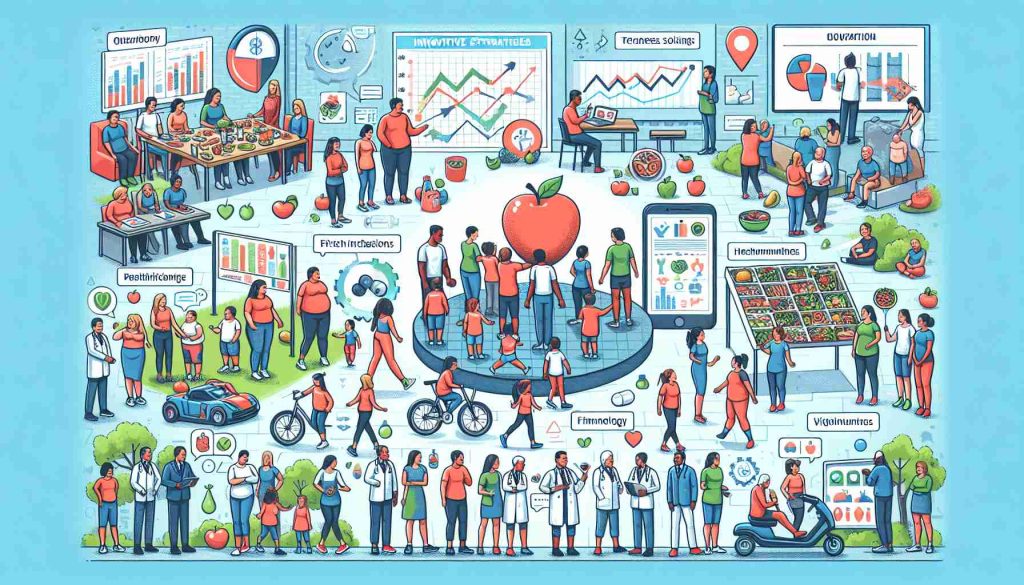Revolutionizing Approaches to Tackle the Obesity Crisis
3 min read
Innovative Strategies to Address the Obesity Epidemic
Diving into the realm of addressing the prevalent obesity crisis within the nation, a visionary leader unveils unique strategies to combat this pressing issue. Rather than focusing on the Health and Human Services nominee, this new approach delves into groundbreaking initiatives set to revolutionize the landscape of public health.
Redefining the Narrative on Obesity
Shifting away from conventional methods, this fresh perspective aims to redefine how society perceives and tackles obesity. By incorporating a blend of holistic approaches and community-based interventions, a transformational journey towards a healthier nation is on the horizon.
Pioneering Solutions for a Healthier Future
Embracing a forward-thinking mindset, these pioneering solutions are set to pave the way for a healthier future. From promoting sustainable lifestyle changes to fostering a culture of wellness, the narrative around obesity is undergoing a profound evolution.
Empowering Individuals Towards Wellness
At the core of this initiative lies a steadfast commitment to empowering individuals on their wellness journey. Through education, support, and access to resources, a new era of health consciousness is emerging, heralding a shift towards a brighter, healthier future for all.
Revolutionizing Approaches to Tackle the Obesity Crisis: Uncovering New Dimensions
As we delve deeper into the realm of addressing the obesity crisis that plagues our society, it is imperative to explore lesser-known facets that hold the potential to revolutionize our approach towards combating this pressing issue. While the previous article touched on groundbreaking initiatives, there are additional perspectives and insights that need to be considered to truly transform the landscape of public health interventions.
Unveiling the Role of Genetics in Obesity
One crucial question that arises when tackling obesity is the influence of genetics on an individual’s predisposition to weight gain. While lifestyle factors play a significant role, recent studies indicate that genetic predispositions can also impact a person’s likelihood of developing obesity. Understanding the interplay between genetics and environmental factors could pave the way for more personalized and effective interventions tailored to individuals’ unique needs.
Exploring the Impact of Socioeconomic Factors
Another essential aspect that demands attention is the intricate relationship between socioeconomic status and obesity rates. Research suggests that individuals from lower-income backgrounds may face greater challenges in accessing healthy food options, engaging in physical activity, and receiving quality healthcare. Addressing these disparities through targeted policies and interventions is crucial in creating a more equitable and inclusive approach to tackling obesity.
Integrating Technology for Enhanced Health Outcomes
In the digital age, the role of technology in promoting health and wellness cannot be overlooked. By leveraging innovative tools such as mobile apps, wearable devices, and telehealth services, individuals can track their progress, receive real-time feedback, and access virtual support networks. Integrating technology into obesity prevention and management programs has the potential to enhance engagement, empower individuals, and improve long-term health outcomes.
Key Challenges and Controversies
While the shift towards innovative approaches brings promise, it also raises important questions and challenges. One key challenge is the potential for stigmatization and discrimination against individuals with obesity, emphasizing the need for sensitive and inclusive language in public health messaging. Additionally, controversies may arise regarding the effectiveness and sustainability of novel interventions, highlighting the importance of rigorous evaluation and ongoing monitoring to ensure positive outcomes.
Advantages and Disadvantages of New Approaches
One of the advantages of revolutionizing approaches to tackle obesity is the potential for greater individual empowerment and autonomy in managing one’s health. By emphasizing personalized interventions and holistic wellness strategies, individuals are more likely to sustain positive behavior changes in the long run. However, a disadvantage could be the resource-intensive nature of some innovative programs, which may limit scalability and accessibility for all populations.
For further insights on innovative strategies and approaches to address the obesity crisis, visit Centers for Disease Control and Prevention (CDC) for comprehensive data, guidelines, and resources in public health.



